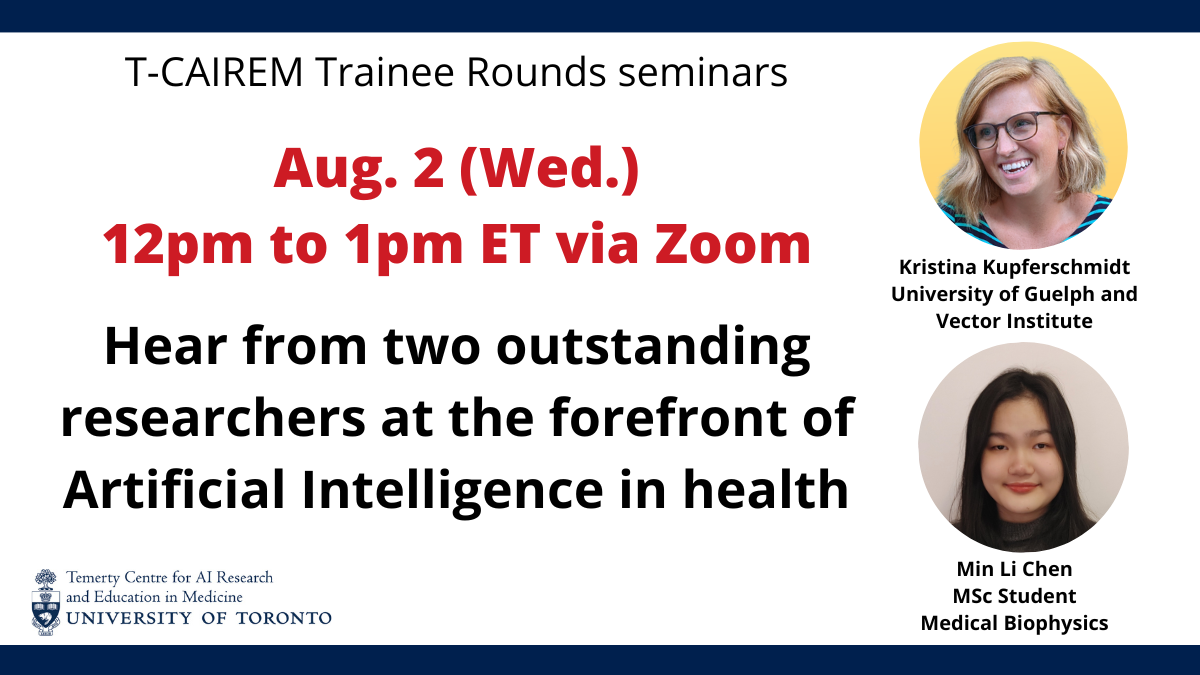Main Second Level Navigation
Trainee Rounds: Kristina Kupferschmidt and Min Li Chen
DATE: August 2, 2023 (Wed.)
TIME: 12pm to 1pm ET
METHOD: Zoom
PRESENTERS: Kristina Kupferschmidt and Min Li Chen
Kristina Kupferschmidt
PhD Student, School of Engineering, University of Guelph and Vector Institute
PROJECT
Back to the building blocks: Designing human-centric-AI for health through data-centric practices
ABSTRACT
AI's potential in controlled settings has been well-established, but its application in real-world clinical workflows remains challenging. Limited by training data, AI systems struggle to generalize well beyond examples. Concerns like algorithmic trust, interpretability, and biased predictions hinder real-world adoption. Human-centered AI (HCAI) addresses these issues by involving end-users in design and evaluation, tailoring models to specific needs. While efforts have focused on interpretability and fairness evaluation, our research explores training data composition, providing insight on model workings and limitations. By emphasizing data-centric approaches and providing context to clinicians, we aim to build trust and improve understanding of model predictions for better decision-making in healthcare.
BIOGRAPHY
Kristina is a PhD student at the University of Guelph and the Vector Institute for Artificial Intelligence, where her research is focused on the intersection of machine learning and health. She earned her BEng in Biomedical Engineering from the University of Guelph and holds an MSc in Rehabilitation Medicine from the University of Alberta. Kristina's interests lie in responsible AI deployment, human-centered design, and improving the practical application of ML technologies in the field of health.
MORE INFORMATION
Min Li Chen
MSc student, Medical Biophysics, Temerty Faculty of Medicine, University of Toronto
PROJECT
Utilization of unsupervised image feature-based clustering to scale classifier design in histopathology
ABSTRACT
Histopathological analysis of patient tissue is a powerful clinical tool for diagnosis and study of human disease but is challenged by inter-subjective variation and need for sub-specialized pathologists. While there is much excitement surrounding use of artificial intelligence (AI) to automate and increase objectivity of microscopic examination, current use cases represent largely proof-of-concepts limiting widespread adoption. To address this, I describe a prototype AI workflow that empowers microscopists to design and share tissue classifiers without need for any sophisticated coding or complex collaborations. Scaling this solution through crowdsourcing could allow for large-scale development of custom classifiers across all relevant histopathology.
BIOGRAPHY
Ms. Chen is working towards a Master of Science in Medical Biophysics at the University of Toronto. She holds an Honours Bachelor of Science from the University of Calgary with a Specialization in Biochemistry. During her undergraduate studies, Chen was involved with biophysics research on light spectrum analysis for gram-negative and gram-positive bacteria. For her Master's, she branched out to digital pathology and is passionate about combining Al knowledge to solve real-world pathology problems and scaling the computation pathology toolbox to meet the collective's needs and interests.

